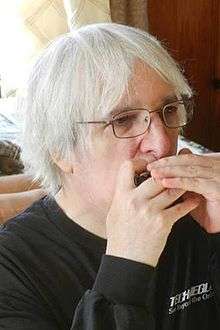Thomas A. McKean
| Thomas A. McKean | |
|---|---|
 | |
| Born |
June 18, 1965 Columbus, Ohio |
| Language | English |
| Nationality | American |
| Citizenship | United States |
| Alma mater | Parkland College |
| Notable works | Soon Will Come the Light, Light on the Horizon |
| Notable awards | National Autism Society of America award for literary excellence |
| Website | |
|
thomasamckean | |
| Autism rights movement |
|---|
Thomas A. McKean is an American autistic author and lecturer. He is a poet, a singer-songwriter, an international speaker and a writer. He is the author of Soon Will Come the Light: A View From Inside the Autism Puzzle and Light On the Horizon: A Deeper View From Inside the Autism Puzzle.[1][2] McKean has claimed that he did not speak until he was 16, but was able to describe how autism was like to him. He constantly fights various symptoms such as making strange noises, and says that perception of the senses causes low-intensity pain. McKean at one time earned a living traveling about and doing conferences and consulting work on autism. He has been described as having the unusual ability to be in the world of autism, yet also possesses the communication skills to describe what that world is like.[3][4][5][6][7]
McKean claimed that he was never given a formal diagnosis growing up, so he was often punished, even though he knew there was something wrong with him. He spent the first half of his elementary school career in a regular classroom, then was in special-education classrooms until the sixth grade. He also claimed to be unpopular in school, and dreaded gym and recess. McKean then spent three years in a psychiatric institution starting at age 14. However, he was eventually elected to the board of the Autism Society of America in 1992.[8] He started his advocacy career after discovering that he was on the spectrum, through attending Autism Society of America chapter meetings and receiving attention for being able to talk about his own experiences as an autistic person.[2]
In Soon Will Come the Light: A View From Inside the Autism Puzzle, a winner of the Autism Society of America's Literary Achievement Award, he described the years that he faced confusion around his disorder. He also claimed to have talents in fields such as computers and technical design, in addition to his passion for writing. This book was one of the first autobiographies to provide unique insight into the world of autism.[2] Janis M. Serak, a member of the Autism Society of America, Board of Directors, reviewed the book in The Advocate, the Autism Society of America's newsletter in 1994. Serak claimed that few books had been written by autistics, and that this book could be useful to parents of autistic children for its first-person portrayal of autism. Overall, he wrote that McKean had sought to understand himself better through writing.[9]
McKean has stated that some people who claim to have autism on the internet portray a very distorted and unrealistic view of what autism really is. These people say autism is the best thing ever and some of them even say it places above the general population and makes them better or superior in some way. He has described the politics of autism as a distraction from the therapies and support needed to treat those who have it.[10] In his 2006 essay "A Danger in Speaking" that McKean questions autistic speakers that have been self-diagnosed. Critics say that this ignores the obstacles and stigma that some autistics face in getting diagnosed.[11]
Thomas McKean was a guest on The Oprah Winfrey Show in 2001. On the show, he said that he was lonely as a child, had to learn emotions, and said that his sensitivity to certain sensations and colors was exaggerated.[10][12][13][14] McKean was also featured in Esquire magazine.[15]
References
- ↑ Smith, Joanne (15 April 2002). "AUTHORS, ONE AUTISTIC, DISCUSS CONDITION, HOW TO RESPOND TO IT". Dayton Daily News. Retrieved 9 March 2016.
- 1 2 3 McKean, Thomas A. (1994). Soon will come the light : a view from the autism puzzle. ([Rev.] ed.). Arlington, Texas: Future Horizone, Inc. ISBN 978-1885477118.
- ↑ Carlstone, Linda Mae (28 July 1994). "Autistic Writer Finds Voice, Delivers A Message Of Hope". Chicago Tribune. Retrieved 9 March 2016.
- ↑ Boyett, Frank (14 October 1994). "Autistic Author Offers Insight into Disorder Few People Understand". The Gleaner.
- ↑ Fiely, Dennis (13 January 1995). "Man Now Speaks For Those Who Suffer in Silence". Columbus Dispatch.
- ↑ Pegram, Cynthia (1999). "Speaker Puts Face on Autism". Lynchburg News & Advance.
- ↑ Barnhart, John (6 February 2002). "Man sees life in picasso-vision". Bedford Bulletin.
- ↑ Asperger Syndrome or High-functioning Autism?. Springer Verlag. 2013. ISBN 978-1461374503.
- ↑ Serak, Janis (May 1994). "Soon Will Come The Light". The Advocate. 26 (3).
- 1 2 Kalning, Diane. "My Interview with Thomas McKean, author and advocate for those on the Autism Spectrum". HealthCentral. Remedy Health Media, LLC. Retrieved 9 March 2016.
- ↑ Yeregau, Melanie (2010). "Circle Wars: Reshaping the Typical Autism Essay". Disability Studies Quarterly. 30 (1). Retrieved 9 March 2016.
- ↑ Ledgin, Norm Ledgin ; foreword by Temple Grandin ; illustrations by Marsha M. (2002). Asperger's and Self-Esteem : Insight and Hope through Famous Role Models. Arlington, Tex.: Future Horizons. ISBN 9781885477859.
- ↑ Coleman, Amy. "The Producers". Oprah. Retrieved 9 March 2016.
- ↑ McKean, Thomas. "Thomas on Oprah". Thomas A. McKean. Retrieved 9 March 2016.
- ↑ "What it Feels like to have Autism". 1 June 2001. Retrieved 9 March 2016.